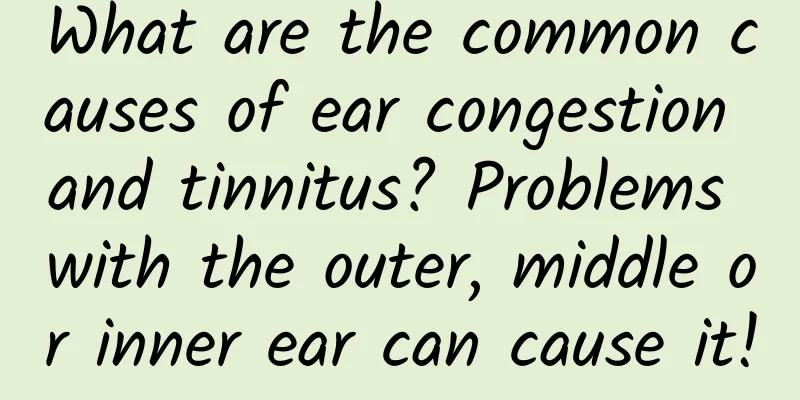What are the common causes of ear congestion and tinnitus? Problems with the outer, middle or inner ear can cause it!

|
Author: Li Xiaoting, attending physician, Beijing Chaoyang Hospital, Capital Medical University Reviewer: Zhang Juan, Chief Physician, Beijing Chaoyang Hospital, Capital Medical University Have you ever experienced ear stuffiness or tinnitus? Can you tell the difference between ear stuffiness and tinnitus? Do you know why ear stuffiness and tinnitus occur? As people's pace of life accelerates and work and life pressures increase, more and more people are experiencing ear stuffiness and tinnitus. Since the impact on life and work is not significant, people often do not pay enough attention to it in the early stages of the disease. However, if not treated in time, these symptoms are likely to become serious and require surgical treatment; they may even be warning signs of certain major diseases, affecting life, health and quality of life. Therefore, when you experience ear stuffiness or tinnitus that lasts for several days, no matter whether the symptoms are mild or severe, you should not ignore them and go to the hospital for diagnosis and treatment in time. Both ear congestion and tinnitus are the most common symptoms of ear diseases. They often appear in the early stages of the disease and are easy to distinguish. Have you ever had water enter your ears while taking a shower? It feels like your ears are blocked, and the sound is louder on one side and quieter on the other. This feeling is called ear stuffiness. Some people say it feels like the ears are blocked by cotton, which is also the feeling. Clinically, it is called hearing loss or hearing impairment. Tinnitus is often manifested as hearing unusual sounds. It may be a buzzing sound, a cicada chirping sound, an electric current sound, a drum beating sound, or a heartbeat sound. The tone may be low or high, and most of the time it does not affect hearing. This feeling is tinnitus. Common causes of ear congestion: 1. Otitis media Sudden stuffiness in one or both ears, accompanied by severe pain, may be a symptom of acute suppurative otitis media. Acute suppurative otitis media is caused by viral or bacterial infection. In the early stage of the disease, the pain is often severe. When the inflammation destroys the eardrum and causes perforation, the pain is relieved instead, and the pus in the middle ear will flow out, showing as ear discharge. If you only experience stuffiness in one or both ears, no ear pain, or only mild ear pain, and have symptoms of nasal diseases such as nasal congestion and runny nose, it may be acute secretory otitis media. This disease is caused by the blockage of the Eustachian tube between the ear and nose. The symptoms are mainly conductive hearing loss and tympanic effusion. The stuffiness in the ear is more obvious. It is more common in children, but it can also occur in adults. Secretory otitis media not only occurs in people with rhinitis, sinusitis, and upper respiratory tract infections, but may also be caused by certain unexpected circumstances. When traveling to high mountains or plateaus, experiencing amusement rides with a large height difference, during takeoff and landing, or after diving, you may suddenly feel stuffy ears and loss of hearing. This situation is caused by a sudden change in air pressure that causes the Eustachian tube to not open, resulting in an imbalance in air pressure inside and outside the ear, causing the eardrum to collapse. In severe cases, liquid may exude from the ear due to high negative pressure, causing secretory otitis media. At this time, it is particularly important to swallow, because swallowing can cause the Eustachian tube to open, which helps to restore the pressure balance inside and outside the ear, thereby effectively preventing the occurrence of such symptoms. It should be noted that in adults, recurrent episodes of secretory otitis media may also indicate a disease in the nasopharynx, and prompt examination should be performed to determine the cause. Figure 1 Original copyright image, no permission to reprint 2. Sudden deafness When you are tired, stay up late, or suffer a major blow in life or work, one ear suddenly feels stuffy, and sometimes tinnitus and dizziness occur, which may indicate sudden deafness. Sudden deafness is a short-term and rapidly progressive disease. Because there is no pain, it often does not attract enough attention in the early stages. However, the treatment of sudden deafness often emphasizes early treatment. The earlier the treatment is received, the greater the possibility of hearing recovery. Therefore, if one ear has stuffiness and tinnitus that lasts for three days or more, you should seek medical treatment as soon as possible. 3. Otitis externa, eczema of external auditory canal When the ear is painful and stuffy, but not very serious, and sometimes there is a small amount of pus discharge, but the ear pain is not relieved after the pus discharge, this may be acute external otitis. If the ear is itchy and stuffy, it may be fungal external otitis or external auditory canal eczema. The stuffiness caused by the above diseases is due to the swelling and narrowing of the external auditory canal, or the blockage of the external auditory canal by pus, exudate, and fungal clumps. It should be noted that the occurrence of these diseases is often related to habitual ear picking or repeated water in the ears, so you need to pay attention to adjusting your personal habits. 4. Cerumen embolism Another common reason for children's stuffy ears is too much cerumen (commonly known as earwax). When water or tears flow into the ears, the cerumen absorbs water and expands, blocking the external auditory canal, which not only makes the ears stuffy, but also affects hearing. Despite this, we do not recommend that parents clean their children's ears themselves. Because children's external auditory canals are narrow and their skin is more delicate and vulnerable, they should seek professional help from a doctor. Common causes of tinnitus: The causes of tinnitus are quite complex, and there are many clinical classification methods. For ease of understanding, the following will briefly introduce the classification method of subjective tinnitus and other-conscious tinnitus. Conscious tinnitus means that only you can hear the sound of tinnitus, but others around you cannot hear it. The sound may be produced in the outer ear or the middle ear. For example, when water enters the external ear canal, you will hear a splashing sound, when earwax falls off to the surface of the eardrum, you will hear a click, or when there is pus or fluid in the tympanic cavity, similar sounds will be produced. In addition, long-term hearing loss may also cause tinnitus, which is common in the elderly, or people with noise-induced hearing loss or drug-induced hearing loss. At this time, the sound frequency of tinnitus is often the same as the frequency of hearing loss. It can appear as soft, low humming, wind blowing and other low-pitched sounds, or high-pitched sounds such as train whistles or cicadas, or a mixture of the above sounds. This kind of tinnitus is mostly caused by problems with the auditory nerve or the hair cells in the cochlea that manage the reception of auditory signals. Sometimes, because the sound frequency of hearing loss does not often appear in daily life, patients themselves often find it difficult to perceive changes in hearing. Figure 2 Original copyright image, no permission to reprint Other people can hear the sound of tinnitus. When other people put their ears close to the tinnitus patient, or put a stethoscope into the external auditory canal of the tinnitus patient, they can hear the sound of tinnitus. There are many reasons for the occurrence of tinnitus, and there are two common ones. One type of tinnitus is not continuous and steady, but beats from time to time, and the frequency is consistent with the pulse. The ear rings when the pulse beats. This type of tinnitus may indicate a problem with the blood vessels in the head and neck. At this time, CT, ultrasound or MRI examination of the blood vessels in the brain and neck may reveal diseases such as vascular malformations, hemangiomas, and vascular bone wall defects. There is also a type of tinnitus that has nothing to do with the pulse, and is a "tick-tick" sound like the movement of a clock hand. It may be a spasm of the muscles around the Eustachian tube or a spasm of the small muscles in the middle ear. At this time, it is necessary to find the corresponding cause of the disease. If sudden tinnitus occurs, and only manifests as tinnitus without other accompanying symptoms, and the attack is intermittent (that is, the tinnitus will subside on its own after it occurs, but will recur after a period of time), you should actively explore the potential cause of this tinnitus. For example, being too tired or drinking a lot of alcohol can cause vascular spasm; or having a cold recently, the virus invades the ear nerve, which can cause tinnitus, and resting for a few days may be enough. Sometimes, ear stuffiness and tinnitus occur at the same time, and sometimes they appear alone. If the ear stuffiness and tinnitus do not recover for a long time, or recur, you should seek medical attention in time. The doctor will conduct corresponding examinations to check one by one to determine the cause of the ear stuffiness and tinnitus and provide timely treatment. |
<<: Feeling sad and sleepy during spring? Psychotherapists: Four tips for adjusting
Recommend
What causes pain in the inner breast?
What is the cause of pain in the inner side of th...
Can I have sex when I am three months pregnant?
Everyone should know that you can't have sex ...
Formation and treatment of uterine fibroids
Uterine fibroids are the most common malignant tu...
Being physically strong does not necessarily mean being healthy. Do you know what mental health problems are?
Text: Liang Yuezhu, Beijing Anding Hospital Illus...
Why does my stomach hurt after my period?
The lack of oxygen due to uterine ischemia is als...
What if I bleed again a few days after my period is over?
Nowadays, many women suffer from gynecological di...
Are your eyes also afraid of the cold? Be careful of these eye diseases caused by "freezing"
After the winter solstice, water turns to ice Wor...
Erythromycin ointment can be applied to the vulva
We all know that erythromycin ointment is an oint...
I have abdominal pain after taking birth control pills
Birth control pills are a must-have for many youn...
Will you faint during childbirth?
For most women, the process of giving birth is de...
Can women run during menstruation?
We all know that the menstrual period is a period...
Microwave treatment of cervical erosion
The causes of cervical erosion are closely relate...
In what environment does konjac grow? How to make konjac salad
Konjac is a very famous weight loss food. It has ...
What should I do if I get stretch marks after giving birth?
After giving birth, mothers will have obvious str...


![[Medical Q&A] What are the classification and treatment strategies of leukemia?](/upload/images/67f0f00cd7fb0.webp)






